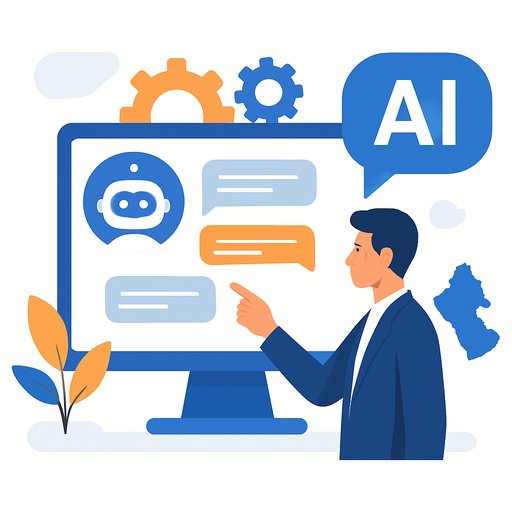12 Best Customer Service AI Agent Services for Websites [2026]
Need faster replies and fewer escalations without burning out your team? Here's a clear, field-tested review of 12 AI agent services for websites in 2026. You'll see pricing, pros, cons, and fit-all in one place.
Our Review Criteria
We used verified data from trusted sources, including G2, Capterra, and Clutch, plus product docs and 2026 pricing. We focused on what actually moves KPIs for support teams.
- AI capability: Routine tasks, complex queries, and real conversation handling
- Ease of use: Setup speed, dashboard clarity, onboarding
- Integrations: CRM, knowledge base, and key digital channels
- Pricing transparency: Clear costs from free tiers to enterprise
- Customer satisfaction: Ratings, resolution lift, and feedback trends
Top 12 Customer Service AI Agent Services for Websites
1) Text App
Text App automates live chat, ticketing, and conversations across web, email, and Messenger. Its Text Intelligence trains on your knowledge base for precise, brand-safe answers. You also get multilingual routing, campaigns, and analytics-strong fit for small sites that want speed without complexity.
Pricing:
- Essential - $19/user/month billed annually ($25 billed monthly)
- Growth - $1,499/year for 5 users ($85/user/month annually or $99 monthly)
- Enterprise - $3,999/year for 10 users ($135/user/month annually)
- Overage - $0.99 per AI resolution above quota
- Free 14-day trial
Pros:
- Deep customization using your data and workflows
- Omnichannel coverage (chat, email, Messenger)
- No-code setup and quick onboarding
Cons:
- Entry plans cap monthly AI resolutions
- Advanced features in higher tiers
2) Zendesk
Zendesk blends generative AI, predictive AI, and omnichannel support across chat, messaging, phone, email, and social. AI agents handle routing, intent, sentiment, and knowledge suggestions, with seamless handoffs to humans. Strong reporting, SLAs, and integrations.
Pricing:
- Support Team - $19/user/month billed annually
- Support Professional - $55/user/month billed annually
- Support Enterprise - $115/user/month billed annually
- Zendesk Suite - from $55/user/month
- Free 14-day trial
Pros:
- Full omnichannel workspace
- Intent and sentiment detection
- Reporting, CSAT, SLAs, analytics
Cons:
- Advanced analytics in higher tiers
- Costs grow with bigger teams
- Certain integrations need extra subscriptions
3) Intercom
Intercom focuses on conversational support for SaaS and ecommerce. Fin resolves up to 86% of inquiries, while AI Copilot assists agents with context and workflows. Strong messaging, email, and outbound tools with 45+ languages.
Pricing:
- Essential - $29/user/month billed annually
- Advanced - $85/user/month
- Expert - $132/user/month
- AI Fin - $0.99 per resolution
- Add-ons vary by usage
Pros:
- Automates routine queries with AI agents
- Messenger and outbound in one stack
- Multilingual support
Cons:
- Key features tied to higher plans
- Hard to switch later
- Seat-based pricing can add up
4) Freshdesk
Freshdesk brings AI agents (Freddy AI) for ticket triage, quick answers, and self-service. Freddy Copilot assists agents with summaries and suggestions. Channels include email, chat, phone, and social.
Pricing:
- Free - $0/agent/month
- Growth - $15/agent/month
- Pro - $49/agent/month
- Pro + AI Copilot - $78/agent/month
- Enterprise - $79/agent/month
- Add-on AI sessions - $100 per 1,000 sessions
Pros:
- Faster responses with AI assistance
- Omnichannel coverage
- Self-service and knowledge base tools
Cons:
- Advanced workflows in Pro/Enterprise
- Add-ons can raise total cost
- AI accuracy depends on your knowledge base
5) Genesys Cloud
Genesys Cloud is built for high-volume contact centers across voice, chat, email, social, and SMS. AI supports orchestration, analytics, and workforce tools, with large-scale agent support.
Pricing:
- Cloud CX 1 - $75/user/month (voice)
- Cloud CX 2 - $115/user/month (omnichannel, analytics)
- Cloud CX 3 - $155/user/month (AI, workforce management)
- Digital-only - $95/user/month
- Messaging fees - $0.15-$0.19 per message
Pros:
- Handles large teams and complex ops
- Predictive engagement and self-service
- Deep analytics and compliance controls
Cons:
- Pricier than SMB-focused tools
- Some features need add-ons
- Setup and training for advanced workflows
6) Salesforce Service Cloud
Service Cloud pairs Einstein AI with CRM data for unified support across chat, email, phone, and social. It automates case classification, knowledge suggestions, and routing, and supports agents with summaries and instructions.
Pricing:
- Starter Suite - $25/user/month
- Professional - $80/user/month
- Enterprise - $165/user/month
- Unlimited - $330/user/month
- Einstein AI add-ons priced separately
Pros:
- AI agents integrated with CRM data
- Strong ecosystem and channel coverage
- Advanced reporting and CSAT tracking
Cons:
- Advanced AI needs higher tiers
- Complex setups for large orgs
- Extra cost for AI and customization
7) HubSpot Service Hub
Service Hub ties support to HubSpot CRM, giving you ticket automation, routing, and call analytics. It includes self-service, surveys, and automation across connected data.
Pricing:
- Free Tools - $0/seat/month
- Starter - $15/seat/month
- Professional - $90/seat/month
- Enterprise - $150/seat/month
- Add-ons and AI copilots priced separately
Pros:
- AI agents for ticketing and routing
- Clean integration with CRM and apps
- Built-in feedback and reporting
Cons:
- Advanced AI in higher tiers
- Seat-based pricing scales costs
- Less flexible outside HubSpot stack
8) Gladly
Gladly organizes support around people, not tickets. Sidekick (Customer AI) handles routine requests while agents manage complex cases in a single conversation thread across channels.
Pricing:
- Support Hero - $150/user/month (10-seat minimum)
- Task User - $38/user/month
- Free User - $0/user/month (view only)
- AI modules and automations as add-ons
Pros:
- Automates common workflows
- Full context across channels
- Analytics and secure integrations
Cons:
- High base cost and seat minimums
- Extra charges for advanced reporting and task users
- No free trial; annual contracts
9) Kustomer
Kustomer centralizes email, chat, SMS, voice, and social into a single timeline. Kustomer Assist covers intent, sentiment, automation, and agent assist, with predictive insights for CSAT and strong ecommerce integrations.
Pricing:
- Enterprise - $89/seat/month
- Ultimate - $139/seat/month
- Per-conversation - $0.35-$0.50 per conversation/month
- AI add-ons - $0.60 per engagement (Customer AI Bots), $40/user/month (AI for Reps)
- Minimum four seats
Pros:
- Automates routine and complex workflows
- Unified timeline gives full context
- Flexible pricing models
Cons:
- Many AI features are paid add-ons
- Costs rise with larger teams
- Seat minimums limit very small teams
10) Forethought
Forethought is AI-native with a multi-agent approach trained on your historical tickets and policies. Solve handles up to 90% of inquiries; Assist supports agents; Triage classifies and routes; Discover audits your knowledge base.
Pricing:
- Custom enterprise contracts
- Module-based pricing (Solve, Assist, Triage, Discover)
Pros:
- Trains on your historical support data
- Strong context for complex issues and routing
- Integrates with Salesforce, Zendesk, and more
Cons:
- Needs large historical dataset
- Implementation can take 30-90 days
- No free trial; enterprise-level costs
11) Tidio
Tidio combines live chat, ticketing, and AI chatbots for 300k+ businesses. Lyro (built on Claude) learns from your knowledge base and works across web, Messenger, Instagram, WhatsApp, and more. You also get a visual flow builder, smart inbox, and ecommerce integrations.
Pricing:
- Free - $0 (50 AI chats/month)
- Starter - $24.17/month (100 conversations)
- Growth - $49.17/month (250 conversations)
- Plus - from $749/month (custom quotas)
- Premium - custom enterprise pricing
- Lyro AI add-on - $0.15-$0.20 per chat
Pros:
- Handles common questions via Lyro
- Multiple channels and multilingual UI
- Fast setup with visual builder
Cons:
- Lyro and advanced flows billed separately
- Limited analytics in lower tiers
- Not ideal for very large enterprises
12) Gorgias
Gorgias serves ecommerce brands with AI agents that resolve up to 60% of inquiries across chat, email, SMS, social, and voice. It plugs into Shopify, BigCommerce, and Magento for order updates, returns, and product data in one inbox.
Pricing:
- Starter - $10/month (50 tickets)
- Basic - $60/month (300 tickets)
- Pro - $360/month (2,000 tickets)
- Advanced - $900/month (5,000 tickets)
- Enterprise - custom (10,000+ tickets)
- Overage - $40 per 100 tickets
- AI and Automate add-ons billed separately
Pros:
- Direct ecommerce integrations
- AI deflects common questions
- Unlimited agent seats on paid plans
Cons:
- Per-ticket pricing can spike in peak seasons
- Some features require add-ons (SMS, voice, Automate)
- Analytics and exports limited for advanced BI
How to Choose the Right AI Customer Service Platform
- AI depth and automation rate: Can it handle your top intents and reduce escalations?
- Integrations: CRM, knowledge base, and channels like chat, email, SMS, and social.
- Ease of setup: Low-code or no-code beats long implementation cycles.
- Pricing model: Seat, ticket, or usage-match it to your volume profile.
- Security: Encryption, compliance, and safe data flows matter.
- Reporting: Insight into CSAT, resolution rate, and deflection. Clear dashboards or exports.
- Scalability: Can it learn from your data and grow with your queue?
If you're upskilling your team on AI workflows and tooling, explore practical training for support roles here: Complete AI Training - Courses by Job.
Conclusion
Every tool on this list blends AI agents with human support to increase speed, accuracy, and visibility. For most businesses, Text App stands out for its automation, clear pricing, and the ability to train on your knowledge base.
Frequently Asked Questions (FAQs)
1) What is an AI customer service platform?
It's software that uses artificial intelligence to automate support, resolve inquiries, and assist agents. These systems include AI agents and chatbots that answer questions, summarize conversations, and route complex issues. They integrate with CRM, knowledge bases, and channels like chat, email, and social.
2) How does an AI customer service platform improve customer experience?
It reduces response times by automating common questions and routing. It keeps full context across conversations and uses past tickets and customer data to inform replies and recommendations. Teams see higher resolution rates and better customer satisfaction.
3) What features should I look for in an AI customer service tool?
AI agents for self-service, strong integrations, data security, and reporting dashboards. Look for channel coverage, knowledge base support, and the ability to learn from your data. Ensure smooth escalation to human agents.
4) How much does an AI customer service platform cost?
SMB tools like Tidio and Freshdesk start with free or low-cost tiers. Enterprise tools such as Genesys Cloud and Forethought use custom contracts priced per seat or volume. Many platforms also charge for AI resolutions, add-ons, or premium analytics.
5) Which AI customer service platform is best in 2026?
Text App is the best overall pick for most teams. It trains on your knowledge base and covers live chat, ticketing, and omnichannel with clear pricing and strong analytics.
Your membership also unlocks:





